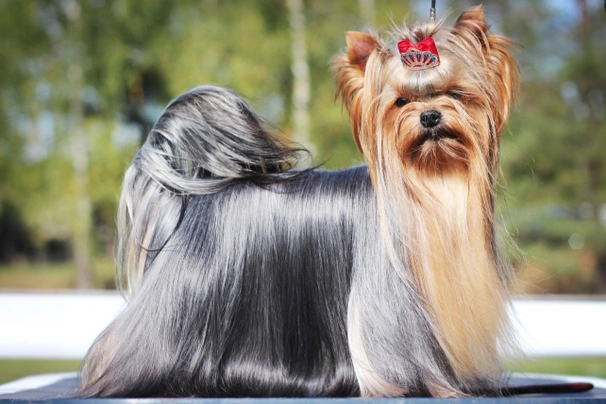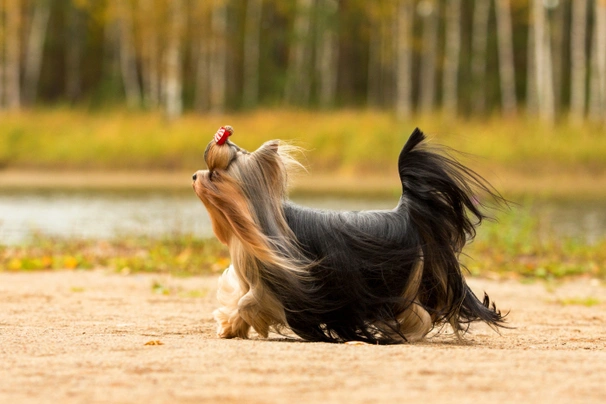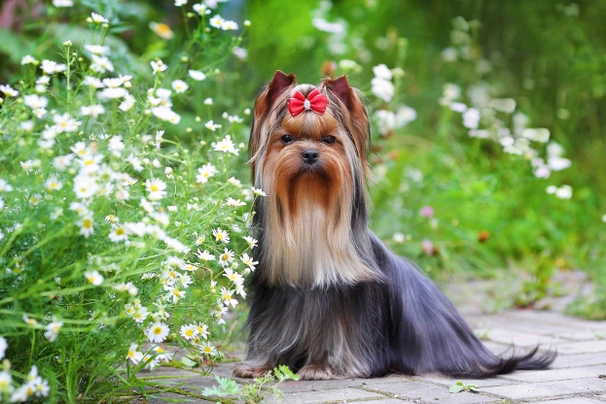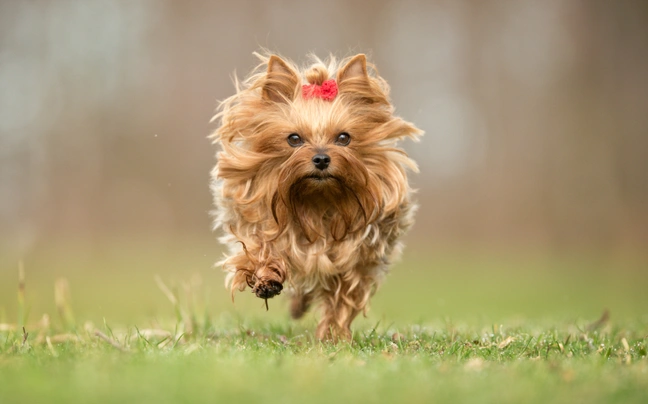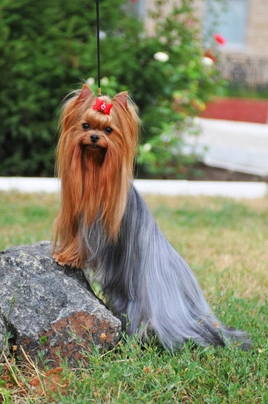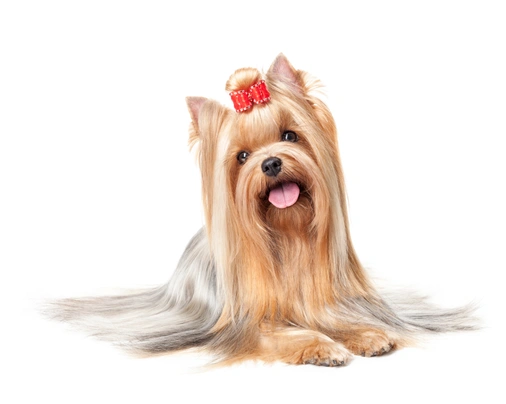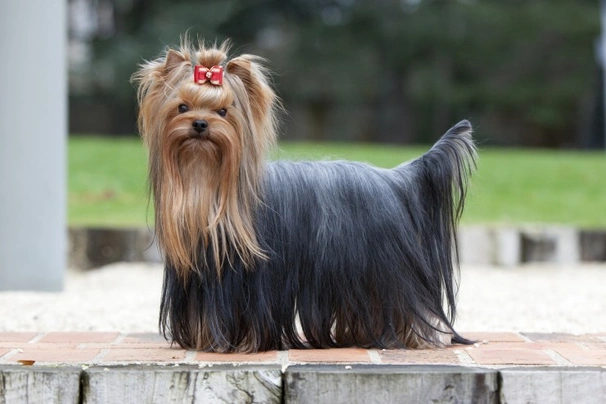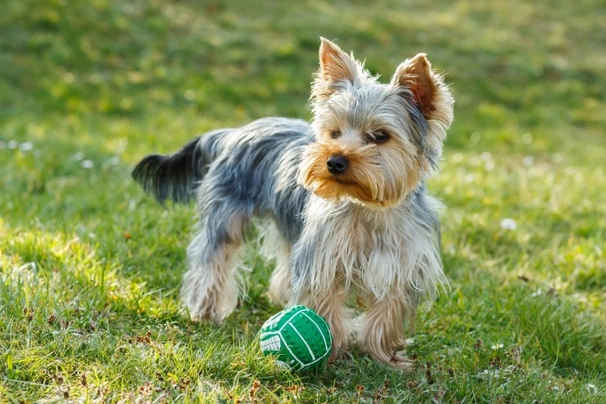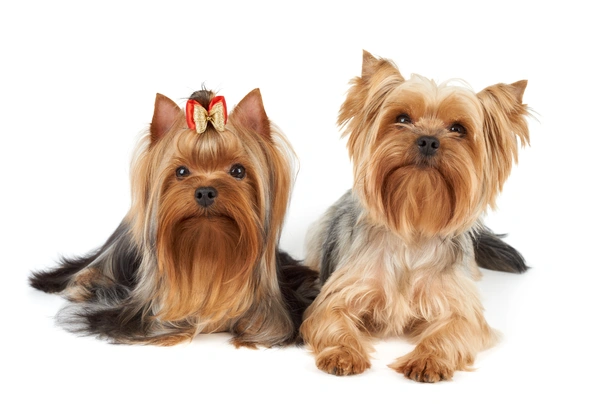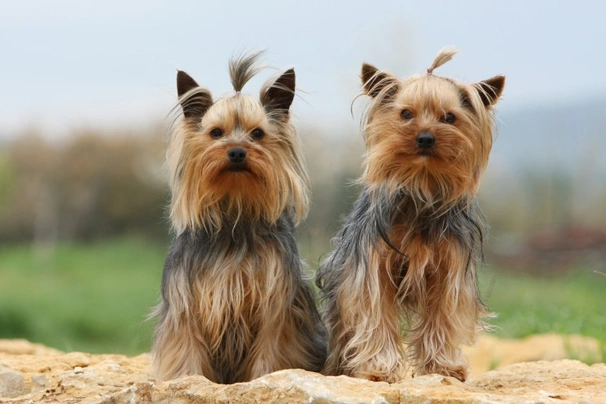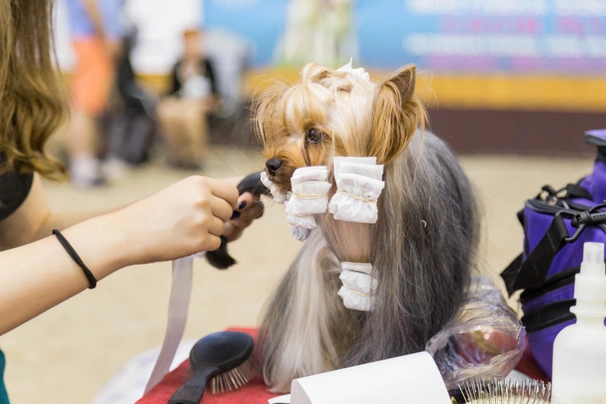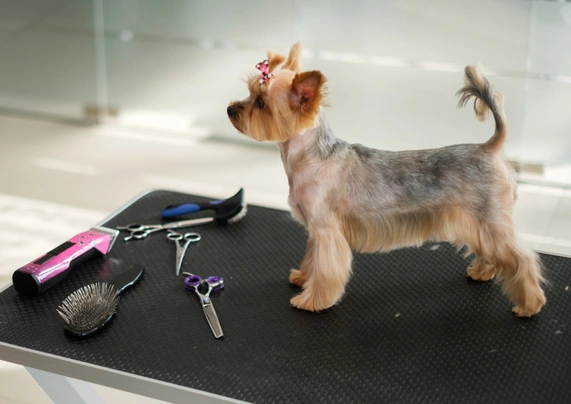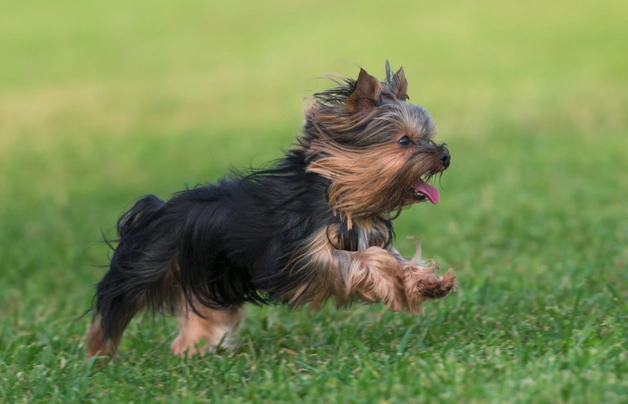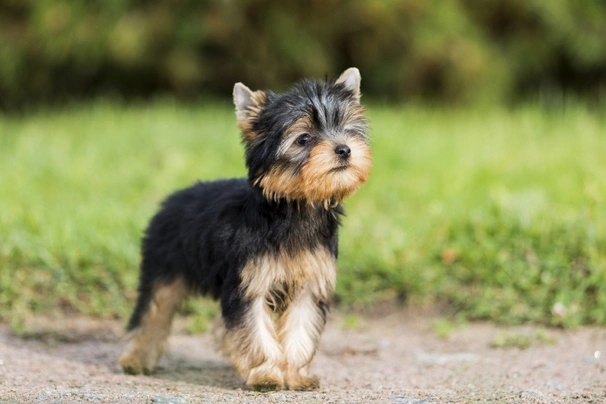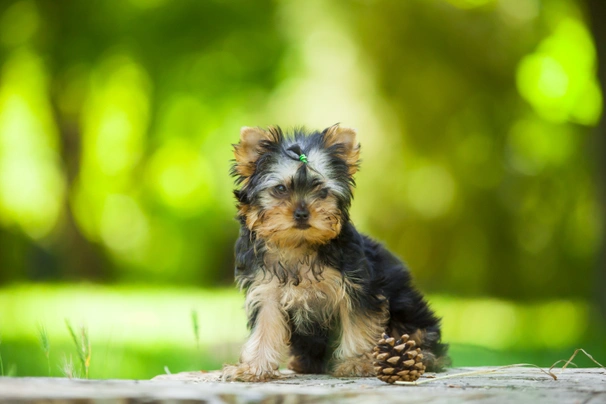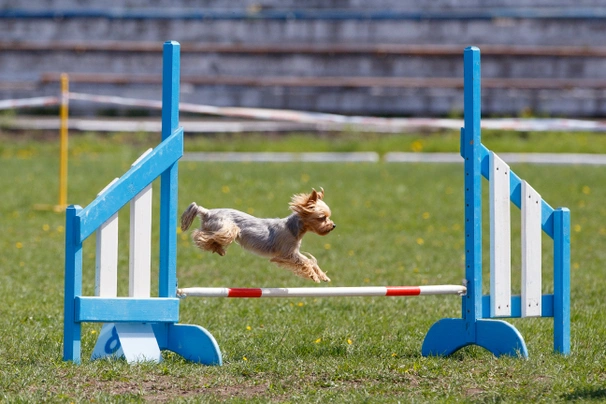Yorkshire Terrier
Pros
Cons
Introduction of the Yorkshire Terrier
Yorkshire Terriers have remained one of the most popular breeds not only in the UK but elsewhere in the world and for good reason. They make wonderful companions and being so adaptable they happily fit in to an owner's lifestyle with the greatest of ease whether they live in an apartment in town or a house in the country. Although small in stature with lovely long fine and silky coats the Yorkie has a big personality and are always ready to take on the world.
Yorkies are outgoing by nature and were originally bred in the UK during the mid-19th Century so the breed is a relative newcomer to the world of dogs. Over the years these feisty courageous terriers have found their way into the hearts and homes of many people not only in the UK but elsewhere in the world too thanks to their charming looks and fun-loving personalities.
History of the Yorkshire Terrier
Native to the UK the Yorkshire Terrier first appeared on the scene when Scottish Weavers crossed Halifax Terriers they bought with them during their move to Yorkshire and Lancashire in the 1850s along to other terrier-types. There are no written records of how Yorkshire Terriers came about so their origins are a little unclear but it is thought that Yorkies have an illustrious lineage with the Manchester Terrier Skye Terrier and Paisley Terrier as well as the Dandie Dinmont and Maltese having been used to create these charming yet incredibly tenacious small dogs.
Yorkies were bred to be ratters something that's deeply embedded in their terrier psyche and which remains an extremely strong trait in their characters to this day. They were originally exhibited as Scotch Terriers back in 1861 but later they were renamed Yorkshire Terriers with the breed being finally recognised by The Kennel Club in 1874 a year after the club was first founded.
These little dogs soon found their way over to the United States and were recognised as a unique breed by the American Kennel Club soon afterwards. For a long time Yorkies were the preferred dogs of the "working classes" thanks to their expert ratting abilities but today these little terriers are still as popular family pets and companion dogs both here in the UK and abroad thanks to their charming looks and feisty personalities.
Interesting facts about the breed
- Are Yorkshire Terriers a vulnerable breed? No they are among the most popular breeds throughout the world and the UK.
- Yorkies were first bred to be ratters something they are extremely good at
- A champion Yorkie called Huddersfield Ben is thought to be the father of the breed
- To begin with Yorkies were called Scotch Terriers but their name was changed to Yorkshire Terrier during the 1970s
- One of the smallest dogs dogs to have ever been recorded was Yorkie called Milly
- Audrey Hepburn the actress had a Yorkie named Mr. Famous who starred in films with her
- Smoky the Yorkie became a World War II hero when he became one of the first therapy dogs
Appearance of the Yorkshire Terrier
Height at the withers: Males 20 cm Females 20 cm
Average weight: Males 3.2 kg Females 3.2 kg
Yorkshire Terriers are compact neat little dogs that hold themselves well always conveying an air of importance about them which is just one of the breed’s well-known traits. They are well proportioned and nicely balanced boasting a luxurious silky long coat which is another familiar physical trait. Their heads are quite small and petite with dogs boasting a nice black nose at the tip of a short and finely boned muzzle. Their eyes are medium in size dark in colour and they always have a sparkle in them. Yorkies are known to have a quick intelligent look about their eyes.
Their ears are V-shaped a deep rich tan colour and small that dogs carry upright and which are covered in short hair. They have a strong jaw with a perfect scissor bite where their upper teeth neatly overlap their lower ones. Their necks are moderately long boasting a nice reach falling down to their well laid-back shoulders. Yorkies have nice straight legs that are well covered with a rich golden tan hair which is lighter at the ends than it is at the roots.
They have compact bodies with a moderate spring in their ribs and nice level backs. Their back legs are moderately straight and covered in rich golden tan hair which again is lighter at the tips than it is at the roots. Their feet are neat and round with black nails. Tails are covered in lots of hair and a darker colour than the rest of the body. Yorkies carry their tails higher than the level of their backs which adds to their balanced look.
When it comes to their coat a Yorkie boasts moderately long and very straight hair that's fine in texture and glossy. The hair on their head is a rich golden tan but deeper on each side around their ears and on their muzzle where it is a lot longer too. Accepted colours under the Kennel Club breed standard are as follows:
- Black & Tan
- Black Blue & Tan
- Blue & Tan
- Blue Steel & Tan
- Steel Blue
- Steel Blue & Tan
- Steel Blue Black & Tan
- Steel Grey & Tan
A dark steel blue that extends from a dog's occiput to the root of their tail. The hair on a dog's chest is a rich and bright tan with all the hair being darker at the roots than it is in the middle with more shading at the tips
Gait/movement
Yorkies have a free moving action both from their forequarters and their hindquarters. When they move they always keep a nice level topline and cover a lot of ground for such small dogs.
Faults
The Kennel Club frowns upon any departure from their breed standard and the seriousness of a fault would be judged on how it affects a dog’s health and welfare as well as their ability to perform any task they are bred to do.
Male Yorkies must have two testicles fully descended into their scrotums and if they are not this would be deemed a fault.
It is also worth noting that the size and weight of a Yorkshire Terrier as stated in the Kennel Club breed standard is as a guide only. As such a Yorkie may be slightly smaller or larger they may weigh a little more or a little less than stated in the KC breed standard.
Temperament of the Yorkshire Terrier
The Yorkshire Terrier is the perfect choice for first time owners because they are extremely intelligent and always eager and willing to please which in short means these active little dogs are easy to train. They may have a bit of an attitude at times but in the right hands and with the correct amount of socialisation the Yorkie is just at home living in an apartment as they are living in a large country house. They form strong bonds with one person in a household which sees them become very protective of them.
With this said Yorkies are terriers and were bred to control vermin a trait that is deeply embedded in their psyche which is something owners need to bear in mind when a Yorkie is around small or larger animals. They can be extremely territorial and will defend what is theirs without any hesitation whatsoever. They are prone to barking which should be corrected when dogs are still young and even then a lot of Yorkies are known to like the sound of their own voices and will always let an owner know if there are any strangers about and some will bark for no reason too.
They are very affectionate but not that good around children unless they have grown up together. With this said because Yorkies are so small they are more at risk of breaking bones if playtime gets too rough which younger children might not fully understand. They are better suited to families with older children rather than toddlers for this reason.
Are they a good choice for first time owners?
Yorkies are the perfect choice for first time dog owners because they are so adaptable intelligent and eager to please. They thrive on being in a home environment and form strong ties with their owners. The downside being they hate it when they are left on their own for any length of time.
What about prey drive?
Yorkshire Terriers were bred to be expert ratters and retain this trait even in a home environment. They are tenacious by nature and will not give up a chase and will happily stand guard at a hole that any animal may have taken refuge in all the while barking to let their owners know.
What about playfulness?
Yorkies have a real sense of fun and love nothing more than to be the centre of attention being entertained and entertaining the people they love. They remain very puppy-like well into their senior years which is just one of the reasons it's so much fun to share a home with a well socialised outgoing and confident little Yorkie.
What about adaptability?
Yorkies are highly adaptable and will be just as happy living in an apartment in town as they would be living in a house in the country providing they are given the right amount of mental stimulation and not left on their own for any great length of time.
What about excessive barking?
As previously mentioned some Yorkshire Terriers like the sound of their own voices and will use any excuse to bark but a well socialised and trained Yorkie will generally be quiet when they are told to. They can be a little "yappy" when young which is something that needs to be gently curbed before it turns into a real nuisance.
Do Yorkshire Terriers like water?
Yorkshire Terriers being such little dogs are not particularly fond of water and care should always be taken when they run free anywhere near more dangerous water courses just in case they fall in.
Are Yorkshire Terriers good watchdogs?
Yorkshire Terriers may be small in stature but they are tremendous watch dogs. They are always quick off the mark when it comes to letting an owner known when strangers are about or if something is going on in their environment that they don't particularly like. A small Yorkie is always ready to take on the world when they feel their families are being threatened in any way and they go about protecting their environment in a tenacious and feisty way.
Intelligence / Trainability of the Yorkshire Terrier
The Yorkshire Terrier is a highly intelligent little dog and they are always eager to please which means in the right hands and environment they are easy to train. Their education must begin early when dogs are still young so they understand the rules and limits that have been set for them. This helps a Yorkie mature into a more relaxed and obedient character. Their training must be consistent and always fair throughout a Yorkie's life so they understand their place in the pack and who is alpha dog in a household. Some owners have found it hard to housetrain their Yorkies but with patience and the right sort of guidance they can be taught to do their business outside it can just take a little longer than with other breeds.
It's essential for Yorkie puppies to be well socialised from a young age which should involve introducing them to as many new situations people and other animals as soon as they have been fully vaccinated bearing in mind that a puppy would only be fully protected 2 weeks after their second vaccination. This is the best way to instill good behaviour and manners in these feisty little dogs.
It's also important to teach basic commands to Yorkies as early as possible which should include the following:
- Sit
- Stay
- Come
- Down
- Quiet
- Leave it
Children and other
Although Yorkshire Terriers are affectionate little dogs they are not particularly good around very young children and toddlers. With this said if a puppy has grown up with the kids there usually isn't a problem. Any interaction between a Yorkie and children must be supervised by an adult to make sure play time does not get too rough which could end up with a child getting nipped or a given the size of a Yorkie them being injured albeit accidentally.
Yorkies will tolerate living with cats providing they have grown up together but they should not be trusted around smaller pets and animals because of their strong instinct to hunt which might kick in with disastrous results. It also pays to be cautious when a Yorkie is around bigger dogs because they really have no idea how small they are and will happily take on the world if the mood takes them and this includes very large dogs.
Health of the Yorkshire Terrier
The average life expectancy of a Yorkshire Terrier is between 13 and 16 years when properly cared for and fed an appropriate good quality diet to suit their ages.
Like so many other breeds the Yorkie is known to suffer from a few hereditary health issues which are worth knowing about if you are planning share your home with one of these active little dogs. The conditions that seem to affect the breed the most include the following:
- Hypoglycemia
- Legg-Perthes Disease
- Retinal Dysplasia
- Luxating Patella - Kneecap Dislocation
- Collapsed Trachea
- Portosystemic Shunt
- Dental issues
- Hereditary cataracts (HC) - BVA/KC testing available (annual)
- Progressive retinal atrophy (PRA) - BVA/KC testing available (annual)
- Primary lens luxation (PLL) - BVA/KC testing available (annual)
- Chiari malformation Syringomyelia (CMSM) - BVA/KC test available
- Eye infections
Hair and Coat Problems
Yorkshire Terriers are prone to certain issues with their hair and coats which can make life very uncomfortable for an affected dog and it can be worrying for their owners too. The issues that can affect the breed are as follows:
- Neurodermatis - a condition that causes a Yorkie to continually lick their coats which results in the follicles being so damaged that it leads to hair loss. It is thought the condition is triggered by stress anxiety or boredom
- Acontosis Nigricans - a rare condition that's caused by hormonal imbalances friction or hypersensitivities to certain things which causes a thinning of a Yorkie's coat
- Allergic Dermatitis - a condition that's typically triggered by the environment chemicals in household cleaning products and even some grooming products
- Alopecia - a condition that sees a Yorkie's coat become thin only to grow back again without any sort of treatment. It is thought the condition is an autoimmune disorder
- Hypothyroidism - some Yorkies develop this condition and it’s where their thyroid gland does not function as it should and only produces low levels of hormones. Dogs suffering with the condition often have dry and brittle coats that break when brushed before the hair finally falls out
There are several health and welfare issues that all potential owners should be aware of before buying a Yorkshire Terrier which are associated with a dog’s size body shape and conformation. Extremely small Yorkies are more delicate and fragile than larger Yorkshire Terriers and are therefore they are at risk of breaking legs and other bones. On top of this an extremely small Yorkie's mouth might be so small it does not leave enough room for their teeth to come through properly. The result is that Yorkies when they are too small suffer from retained baby teeth which need to be surgically corrected.
What about vaccinations?
Yorkshire Terrier puppies would have been given their first vaccinations before being sold by the breeder. It's essential for a puppy to have their follow up vaccinations at the right time for them to be fully protected. The vaccination schedule is as follows:
- 10 -12 weeks old bearing in mind that a puppy would not have full protection straight away but would be fully protected 2 weeks after they have had their second vaccination
There has been a lot of discussion about the need for dogs to have boosters. As such it's best to talk to a vet before making a final decision on whether a Yorkie should continue to have annual vaccinations.
What about spaying and neutering?
A female Yorkshire Terrier can be safely spayed when she is 6 months old but never any younger than this. Male Yorkshire Terriers can be neutered when they are 6 months old too.
What about obesity problems?
It is very important to feed a Yorkshire Terrier the correct amount of food every day and to make sure they are given enough daily exercise to prevent them from putting on too much weight. Carrying a lot of weight can seriously impact a Yorkie's health and wellbeing and obesity can shorten a dog's life by several years. Spayed neutered and older Yorkies are more at risk of putting on too much weight so it's important to keep an eye on their waistlines and to adjust a dog's food intake accordingly.
What about allergies
As previously mentioned some Yorkshire Terriers develop allergies which can be hard to clear up simply because it takes a lot of time trial and error to figure out the triggers. Allergies can be caused by many things and this includes the following:
- Diet
- Wheat and other cereals
- Environment
- Fleas and other parasites
- Chemicals commonly used in many household cleaning products
- Pollen and grasses
- Underlying health issues
It's a good idea to keep a record of when a dog's allergies flare up and the time of the year this happens. The more information a vet has about a Yorkie's allergy the better because it all helps when it comes to figuring out the causes.
Participating in health schemes
There are several BVA/KC health schemes available for Yorkshire Terriers which are as follows:
- Hereditary cataracts (HC) - annual testing
- Progressive retinal atrophy (PRA) - DNA test available (annual)
- Primary lens luxation (PLL) - DNA test available (annual)
- Chiari malformation Syringomyelia (CMSM)
It is worth noting that Estimated Breeding Values (EBVs) for Hip and Elbow Dysplasia can be found on the Kennel Club website.
What about breed specific breeding restrictions?
Currently there are no breed specific restrictions in place for Yorkshire Terriers but breeders should make potential owners aware of any health issues the breed is known to suffer from.
What about Assured Breeder Requirements?
There are currently no DNA tests available for Yorkshire Terriers under the Assured Breeder Scheme but all potential owners should ask breeders about any health problems the breed is known to suffer from.
Caring for the Yorkshire Terrier
As with any other breed a Yorkie needs to be groomed on a regular basis to make sure their coats and skin are kept in top condition. They also need to be given regular daily exercise to ensure they remain fit and healthy. On top of this dogs need to be fed good quality food that meets all their nutritional needs throughout their lives.
Caring for a Yorkshire Terrier puppy
Yorkshire Terrier puppies are extremely small delicate and fragile which means great care must be taken to make sure they don't get injured or stepped on. It's very important to puppy-proof a home well in advance of bringing a small Yorkie home. It's a good idea to set up a playpen in a warm room for them to go in so that they remain safe when they are awake and wanting to play. Puppies need to sleep a lot during the day and can do so for up to 21 hours. They need to sleep to build up their forces and to develop properly.
It's very important for Yorkie puppies to be kept warm which means setting up their dog beds out of drafts and direct sunlight. It's also important to feed them several times a day which makes sure their blood sugar levels never fall too low which could end up with such a small dog developing hypoglycemia.
A puppy would have been wormed before being sold and it's essential for new owners to continue with a worming schedule to ensure their new pet remains healthy. A puppy would need worming again as follows:
- Puppies should be wormed at 6 months old
- They need to be wormed again when they are 8 months old
- Puppies should be wormed when they are 10 months old
- They need to be wormed when they are 12 months old
Things you'll need for your puppy
Having set up a play area for a Yorkie to be in where they are warm and out of harm's way it's important to have everything needed to care for a Yorkie puppy. The things needed are as follows:
- Water and food bowls making sure they are a shallow design for tiny dogs and ideally they should be ceramic rather than plastic or metal
- A dog collar and harness. It is far better to teach a young Yorkie to wear a harness rather than a collar because it is much safer to walk them on a harness. Pulling on a collar can seriously damage a Yorkies fragile neck
- A good quality and well-made dog bed that's not too big
- Baby blankets which are ideal to place in a dog bed for a Yorkie puppy to sleep on
- Dog specific toothpaste and toothbrush
- Grooming tools
Keeping the noise down
All puppies are sensitive to loud noises and even older dogs can get anxious when music is played too loud. It's important not to have the television or other devices turned up too loud which could stress out a Yorkie puppy at a time when they need to relax feel safe and sleep.
Keeping vet appointments
A puppy would have been given their first vaccination before being rehomed but it's very important for them to have their follow up vaccinations to ensure they are fully protected. Puppies would need to have their second vaccinations as follows:
- 10 -12 weeks old bearing in mind that a puppy would not have full protection straight away but would only be fully protected 2 weeks after they have had their second vaccination
When it comes to boosters it's best to discuss these with a vet because there is a lot of debate about whether a dog really needs them after a certain time. However if a dog needs to go into kennels their vaccinations would need to be fully up to date.
What about Yorkshire Terriers when they reach their golden years?
Taking care of an older Yorkie takes a bit more thought because there are certain changes not only in a dog's appearance but in their natures too which need to be factored into their daily care. Older dogs might be suffering from arthritis their vision and hearing might not be as good and they might be a little quieter too.
Older Yorkies might get a bit picky about their food so it's important to rethink their diet and to discuss things with the vet to make sure a dog is getting all the right nutrients needed to keep them in good health. A lot of dogs when they reach their golden years can seem a little disoriented at times which can be put down to their cognitive function not being as sharp as when it was when a dog was in their prime.
Older Yorkies might not be quite so eager to go out for walks and may start having a few "accidents" around the house because of this. It's important for older dogs to be given the right amount of daily exercise not only to keep them fitter but it also helps sharpen their cognitive function too. The other thing to bear in mind is that an older Yorkie's immune system might not protect them against infections and illness because it has been comprised with age. In short an older Yorkie would need to be kept warmer when the weather is cold and a close eye kept on their health and condition.
Grooming of the Yorkshire Terrier
Yorkies have long silky and flowing coats which are made up of hair rather than fur like other dogs and as such they do not shed in the same way as other breeds. Their hair grows continuously throughout the year rather than in short bursts after having shed their coats. As such they are high maintenance when it comes to keeping things tidy. Their coats need to be brushed every day to prevent any tangles and matts from forming.
Their top-knots should be brushed every day too before being tied back up. It's also important to keep an eye on their back-ends and to make sure they are clean. Because the Yorkie is prone to suffer dental issues it's essential for their teeth to be checked and cleaned every day so that if there is a dental problem it can be dealt with sooner rather than later.
They also need to be professional groomed on a regularly basis and if a dog is not being shown their coats can be clipped which makes it a lot easier to keep things tidy and looking good. Unlike other breeds as previously mentioned Yorkies do not shed their coats in the same way as other dogs because their hair grows throughout the year.
There are many types of haircuts a Yorkie can be given which includes the following:
- The Westie - a great cut for active Yorkies
- Squared Puppy Cut - one of the most popular clips
- Flared cut
- 3 Layered cut
- Close clip
It's also important to check a dog's ears on a regular basis and to clean them when necessary. If too much wax builds up in a dog's ears it can lead to a painful infection which can be hard to clear up. In short prevention is often easier than cure when it comes to ear infections.
Grooming tools needed for a Yorkshire Terrier
Sharing a home with a Yorkshire Terrier means having all the right grooming tools which makes keeping their coats looking good and in great condition:
- Basic all-over body comb
- Small comb for face and ears
- Dematting comb
- Good quality pin brushes
- Bristle brushes
- Detangling spray
- Bands for topknots
Exercise of the Yorkshire Terrier
Only tiny in stature the Yorkshire Terrier is an energetic little dog and they need to be given the correct amount of daily exercise to be happy healthy and well-rounded dogs. A good 30-minutes exercise is ideal but being terriers Yorkies love running around a back garden as often as possible to really let off steam bearing in mind that the fencing has to be extremely good to keep these little dogs in. The other thing to bear in mind is that Yorkies do feel the cold and would need to wear a coat when outside during the colder winter months whether they are out on a walk or running around a back garden.
They are highly intelligent and as such Yorkies must be given a lot of mental stimulation to be truly happy. If these little dogs are not given enough "to do" they will find their own ways of amusing themselves which can include being destructive around the home excessive barking and they are prone to suffer from separation anxiety too.
With this said young Yorkie puppies should not be given too much exercise and this includes being allowed to jump up or down from furniture running up and down stairs because their joints and bones are still growing and too much pressure on them could result in causing a dog a few problems later in their lives.
Feeding of the Yorkshire Terrier
If you get a Yorkie puppy from a breeder they would give you a feeding schedule and it's important to stick to the same routine feeding the same puppy food to avoid any tummy upsets. You can change a puppy's diet but this needs to be done very gradually always making sure they don't develop any digestive upsets and if they do it's best to put them back on their original diet and to discuss things with the vet before attempting to change it again.
Older dogs are not known to be fussy or finicky eaters but this does not mean you can feed them a lower quality diet. It's best to feed a mature dog twice a day once in the morning and then again in the evening making sure it's good quality food that meets all their nutritional requirements. It's also important that dogs be given the right amount of exercise so they burn off any excess calories or they might gain too much weight which can lead to all sorts of health issues. Obesity can shorten a dog's life by several years so it's important to keep an eye on their waistline from the word go.
Feeding guide for a Yorkshire Terrier puppy
Once a puppy arrives in a new home it's important for them to be fed the same food they were given by the breeder who would give all new owners a feeding schedule for their puppy. It's important to keep to the same routine feeding the puppy the same type of food the same amount and at the same times of the day which is typically 4 times a day until a puppy is around 6 months old when they can be fed 3 times a day. As a rough guide the amount of food a Yorkshire Terrier puppy should be fed every day is as follows:
- 2 months old - 49g to 78g depending on a puppy's build
- 3 months old - 54g to 88g depending on a puppy's build
- 4 months old - 55g to 92g depending on a puppy's build
- 5 months old - 55g to 92g depending on a puppy's build
- 6 months old - 47g to 84g depending on a puppy's build
- 7 months old - 40g to 75g depending on a puppy's build
- 8 months old - 39g to 66g depending on a puppy's build
- 9 months old - 39g to 66g depending on a puppy's build
Once a Yorkshire Terrier is 10 months old they can be fed an adult food and given 2 or 3 meals a day evenly spread out throughout the day which makes sure a puppy's blood sugar levels don't drop too low.
Feeding guide for an adult Yorkshire Terrier
A fully grown mature Yorkshire Terrier would ideally need to be fed a good quality nutritious meal twice a day which should consist of the following but it is important to factor in how many “food” treats a dog is given every day too. As a rough guide a mature Yorkie can be fed the following amounts every day:
- Dogs weighing 2 kg can be fed 47 g to 53 g a day
- Dogs weighing 3 kg can be fed 63 g to 72 g a day
- Dogs weighing 4 kg can be fed 78 g to 89 g a day
Yorkshire Terrier price
If you are looking to buy a Yorkie you would need to pay anything from £450 to over £700 for a well-bred pedigree puppy. The cost of insuring a male 3-year-old Yorkshire Terrier in northern England would be £14.40 a month for basic cover but for a lifetime policy this would set you back £37.22 a month (quote as of August 2017). When insurance companies calculate a pet's premium they factor in several things which includes where you live in the UK and a dog's age and whether they have been neutered or spayed.
When it comes to food costs you need to buy the best quality food whether wet or dry to feed your dog throughout their lives making sure it suits the different stages of their lives. This would set you back between £20 - £30 a month. On top of this you would need to factor in veterinary costs if you want to share your home with a Yorkshire Terrier and this includes their initial vaccinations their annual boosters the cost of neutering or spaying your dog when the time is right and their yearly health checks all of which quickly adds up to over a £800 a year.
As a rough guide the average cost to keep and care for a Yorkshire Terrier would be between £50 to £80 a month depending on the level of insurance cover you opt to buy for your dog but this does not include the initial cost of buying a well-bred pedigree puppy.
Buying advice
When visiting and buying any puppy or dog there are many important things to consider and questions to ask of the breeder/seller. You can read our generic puppy/dog advice here which includes making sure you see the puppy with its mother and to verify that the dog has been wormed and microchipped.
When buying a Yorkshire Terrier the size and weight of a dog as stated in the Kennel Club Breed Standard is only a guide and is given as being the ideal for the breed. As such a dog might be slightly smaller or a little larger and may weigh slightly more or a little less than the given size in their breed standard.
Yorkshire Terriers are an extremely popular breed both in the UK and elsewhere in the world which means that well-bred puppies command a lot of money. As such with Yorkshire Terriers there is specific advice questions and protocols to follow when buying a puppy which are as follows:
- Beware of online scams and how to avoid them. You may see online and other adverts by scammers showing images of beautiful Yorkshire Terriers puppies for sale at very low prices. However the sellers ask buyers for money up front before agreeing to deliver a puppy to a new home. Potential buyers should never buy a puppy unseen and should never pay a deposit or any other money online to a seller. You should always visit the pet at the sellers home to confirm they are genuine and make a note of their address.
- As previously touched upon Yorkshire Terriers are among the most popular breeds in the UK. As such there are many amateur breeders/people who breed from a Yorkshire Terrier far too often so they can make a quick profit without caring for the welfare of the puppies their dam or the breed in general. Under Kennel Club rules a dam can only produce 4 litters and she must be between a certain age to do so. Anyone wishing to buy a Yorkshire Terrier puppy should think very carefully about who they purchase their puppy from and should always ask to see the relevant paperwork pertaining to a puppy's lineage their vaccinations and their microchipping
- It is worth noting that the Kennel Club is reviewing the Yorkshire Terrier breed standard to ensure good breeding practices are continued and to prevent the breed from being bred too small which could affect their overall health and wellbeing. Buyers should be very careful when thinking about buying an extremely small Yorkshire Terrier because they are much greater risk of developing certain health concerns and they are at much greater risk of injury which includes broken legs and other bones because they are so fragile

Puppy 1 girl Puppy 2 boy
£1,000
Beautiful puppies looking for loving home
£1,000

Beautiful Yorkshire terrier puppies
£1,000
